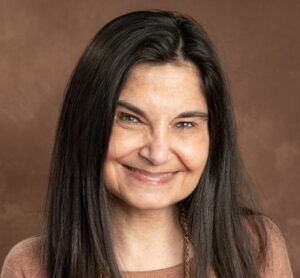BY Marissa McCloy | October 17, 2023
Paula Jorde Bloom’s legacy brought 2023 Scholarship Winner Mona Webber to Leadership Connections; Mona then brought her newfound inspiration and ideas to her child care center.

Mona Webber
Leadership Connections introduced the 2023 Paula Jorde Bloom scholarship winner to Carla Sparks and Sarah Lukas, the authors of “Be the Manatee: Affirming Advice for Your Leadership Journey.” Webber found their workshop so inspiring she suggested that her school purchase the book for her center’s staff and coordinated a session with Sparks and Lukas.
According to Webber, the opportunity to connect with leaders across the country was a highlight of her Leadership Connections experience.
“I think it was great because we could connect and network with so many leaders within the field — Birth to Five, home child care, Headstart, quality specialists and coaches — and not just people from Chicago, but all over the country.”
Webber emphasizes the importance of advocating for her staff.
“The teacher’s voice is so critical,” she said. “It is critical to use our voice for teachers. A lot of the policymakers making decisions are not the ones in the classroom — we are.”
Webber spent years in the classroom working as a teacher before becoming an assistant director and, last year, became a Director at the Goddard School in Darien, IL. She said her service as a 2021-2022 Teach Plus Illinois Early Childhood Policy Fellow motivated her to advocate more strongly for children and teachers.
Webber sees advocacy and professional development opportunities, such as the “Be the Manatee” session, as crucial to her role as a leader. But on a more individual level, she says, it’s important to encourage staff to take care of themselves.
“Teachers right now, because of COVID, are dealing with a lot of different things we didn’t deal with years ago,” she said.
During COVID, she started selecting motivational quotes to hang in classrooms every Friday. Now, she said, a few of the classroom teachers at her school have started finding and posting their motivational quotes around the center. She even sees these in the employee bathroom these days.
Mona believes that, as an educator, you always aspire to learn and grow.
“You can just tell — with everyone at the McCormick Center and all of the presenters — how passionate everybody is,” Webber said.
Paula Jorde Bloom, the McCormick Center founder, dedicated her career to bringing national attention to the role of leaders in early care and education and inspiring those leaders to learn more and improve the quality of their programs. The Paula Jorde Bloom Scholarship Fund was established by her family after her passing in 2018, allowing emerging and aspiring leaders like Webber to attend Leadership Connections.
The Paula Jorde Bloom Scholarship will be awarded at the Leadership Connections 2024 National Conference to an early childhood education professional aspiring to learn and grow. Click here to learn more and apply for the 2024 Paula Jorde Bloom Scholarship to Leadership Connections.





